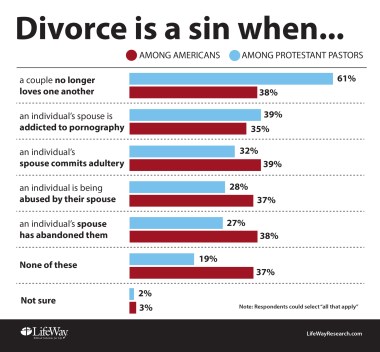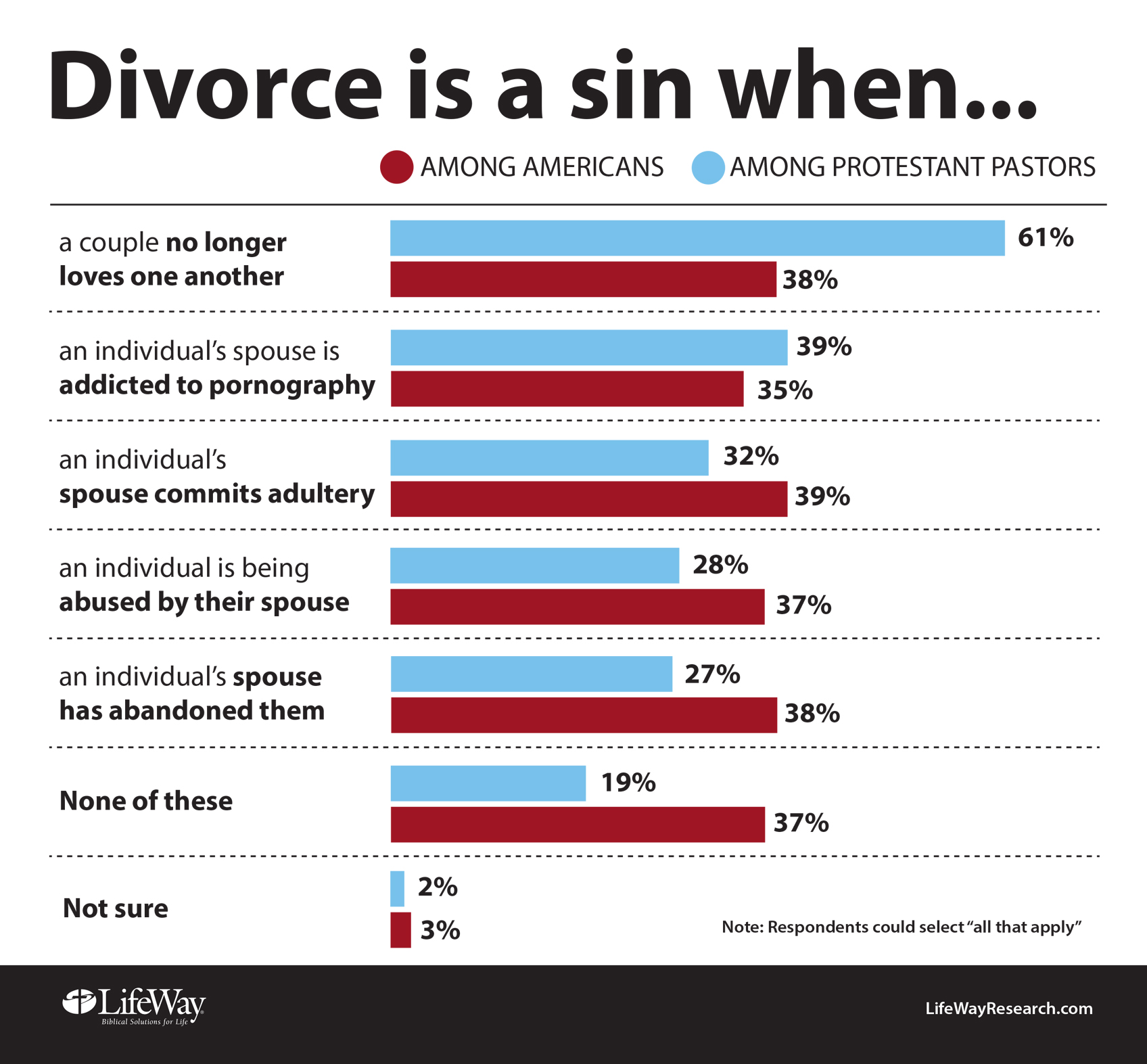About a third of Americans—and a quarter of Protestant pastors—say it is a sin to get divorced in cases of spousal abuse.
And many Americans are less forgiving than their pastors when it comes to divorce, especially in cases of adultery or abandonment.
Those are among the findings from two newly-released surveys by Nashville-based LifeWay Research.

Researchers polled 1,000 Americans and 1,000 Protestant senior pastors on five reasons why couples get divorced: no longer being in love; porn addiction; adultery; spousal abuse; and spousal abandonment.
The researchers then asked respondents if each reason for divorce was a sin.
Overall, about four in 10 (39 percent) Americans say divorce is a sin when one partner has committed adultery. A similar number says divorce is a sin, even in cases of abuse (37 percent) or abandonment (38 percent).
By contrast, about a third (32 percent) of Protestant pastors say divorce is a sin in cases of adultery. That drops to about a quarter for divorces in cases of abuse (28 percent) or abandonment (27 percent).
The abuse numbers were puzzling, said Ed Stetzer, executive director of LifeWay Research. Few people, he said, would advise a spouse to stay with an abuser.
“It could be that people think divorce in cases of abuse is still a sin, even though it may be the best option,” he told CT.
Earlier, this year, CT’s Open Question feature asked, “After domestic violence, why should a Christian wife call the police, not a pastor first?”
CT asked Justin Holcomb, co-author of Is It My Fault? Hope and Healing for Those Suffering Domestic Violence, how best to interpret the survey findings.
"It is important to be clear what we are talking about—a person battering their spouse physically, emotionally, and psychologically," Holcomb said by email today.
Some pastors, he added, counsel spouses to stay in a marriage despite cases of abuse:
I think there are a few reasons why many pastors and Americans unfortunately believe it is a sin for divorce in cases of abuse. One reason could be they hold marriage in high regard in the midst of a culture that seems to devalue marriage. However, they may be misapplying this value and think taking a zero-tolerance stance on divorce will stem the tide.
A 2014 LifeWay Research survey found that domestic abuse remains a taboo subject in the pulpit. Almost two-thirds of the 1,000 Protestant pastors in that survey said they speak about domestic violence once a year or less.
Earlier this year, the Post and Courier newspaper in Charleston, South Carolina, won a Pulitzer Prize for its series on domestic abuse, entitled “Till Death do Us Part.” Reporters found that churches in South Carolina struggled on how to address abuse.
About two-thirds of evangelical pastors and 6-in-10 pastors overall say that getting a divorce is sinful when the couple no longer loves one another. Only a third (38 percent) of Americans say it is sinful in that circumstance.
In cases of porn addiction, 39 percent of all Protestant pastors and 35 percent of Americans say such a divorce is sinful.
Researchers asked if none of the five reasons for divorce was a sin.
In response, 14 percent of evangelical pastors, 19 percent of Protestant pastors, and 37 percent of Americans agree that none of the five reasons for divorce was a sin.
The survey also found geographical differences with people from Western states more likely (51 percent) to say none of the five reasons for divorce was sinful.
Evangelical and mainline pastors also differed in their views. Some 14 percent of evangelical and 28 percent of mainline pastors said none of the five were a sin. (The LifeWay survey was completed in September 2014.)
Other research shows that both marriage and divorce rates are in decline overall.
Despite wide-spread fears that half of marriages end in divorce, the actual rate is closer to a third of marriages, The New York Times reported last year.
“About 70 percent of marriages that began in the 1990s reached their 15th anniversary (excluding those in which a spouse died), up from about 65 percent of those that began in the 1970s and 1980s,” reported the Times.
According to a 2007 report from the nonpartisan National Bureau of Economic Research, the divorce rate per thousand people peaked in 1981 but has declined ever since.
The divorce rate has risen in recent years among older Americans.










